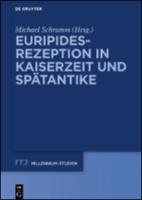Euripides-Rezeption in Kaiserzeit und Spätantike
| dc.contributor.editor | Schramm, Michael | |
| dc.date.accessioned | 2021-12-07T16:15:28Z | |
| dc.date.available | 2021-12-07T16:15:28Z | |
| dc.date.issued | 2020 | |
| dc.identifier | ONIX_20211207_9783110677072_33 | |
| dc.identifier | OCN: 1163878399 | |
| dc.identifier.issn | 1862-1139 | |
| dc.identifier.uri | https://library.oapen.org/handle/20.500.12657/51678 | |
| dc.language | German | |
| dc.language | English | |
| dc.relation.ispartofseries | Millennium-Studien / Millennium Studies | |
| dc.subject.classification | thema EDItEUR::D Biography, Literature and Literary studies::DS Literature: history and criticism::DSB Literary studies: general::DSBB Literary studies: ancient, classical and medieval | en_US |
| dc.subject.classification | thema EDItEUR::N History and Archaeology::NH History::NHC Ancient history | en_US |
| dc.subject.other | Euripides | |
| dc.subject.other | reception | |
| dc.subject.other | tragedy | |
| dc.title | Euripides-Rezeption in Kaiserzeit und Spätantike | |
| dc.type | book | |
| oapen.abstract.otherlanguage | During the Imperial Rome Age and late antiquity, Euripides was considered a tragic dramatist par excellence, and, alongside Homer, was the most frequently cited poet. This book examines the reception of complete and partially transmitted Euripidean tragedies into the Greek language vis-à-vis key authors and literary genres of the Imperial Rome Age and late antiquity, situating them in the cultural and literary-historical context of the times. | |
| oapen.identifier.doi | 10.1515/9783110677072 | |
| oapen.relation.isPublishedBy | 2b386f62-fc18-4108-bcf1-ade3ed4cf2f3 | |
| oapen.relation.isbn | 9783110677072 | |
| oapen.relation.isbn | 9783110671650 | |
| oapen.relation.isbn | 9783110677157 | |
| oapen.series.number | 83 | |
| oapen.pages | 454 | |
| oapen.place.publication | Berlin/Boston |

